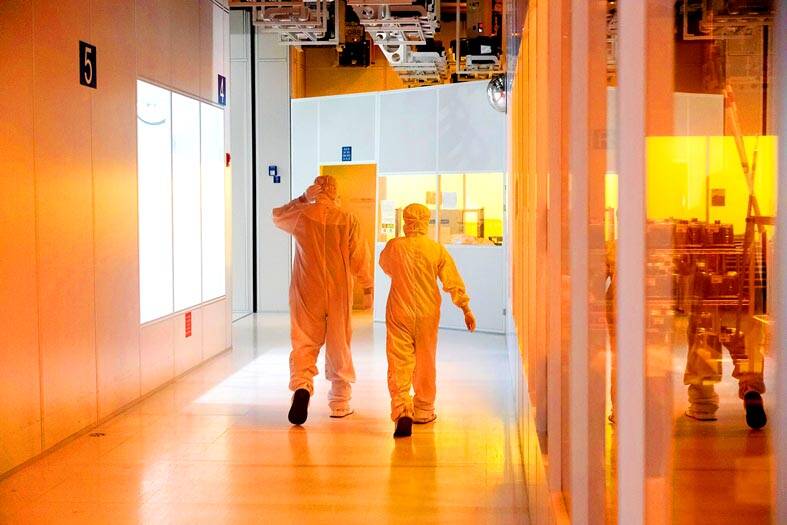Micron Technology Inc, the largest US maker of computer memory chips, gave a strong sales forecast for the current quarter, bolstered by demand for artificial intelligence (AI) products.
Fiscal third-quarter revenue would be about US$8.8 billion, the company said in a statement on Thursday. That compares with analysts’ average estimate of US$8.55 billion.
Profit would be about US$1.57 a share, excluding certain items, compared with the US$1.48 analysts expected on average.

Photo: Bloomberg
Micron shares, up 22 percent this year through Thursday’s close, jumped about 2 percent in extended trading following the announcement.
Micron is seeing strong demand for components used in data center machines that develop and run artificial intelligence software. Its traditional markets — chips for phones and PCs — have been weaker, but they have been showing signs of a recovery.
Second-quarter sales climbed 38 percent to US$8.05 billion, Boise, Idaho-based Micron said, compared with analysts’ average forecast of US$7.91 billion.
Earnings grew to US$1.56, minus certain items, topping the US$1.43 prediction.
“Data center revenue tripled from a year ago,” Micron CEO Sanjay Mehrotra said in the statement. “We are on track for record revenue and significantly improved profitability in fiscal 2025.”
The company’s high-bandwidth memory has become a vital piece of AI systems.
Revenue from that technology crossed US$1 billion in the second quarter, Micron said, citing “strong execution and robust AI demand.”
One weak spot was the company’s gross margin, the percentage of sales remaining after deducting the cost of production. It was 37.9 percent in the second quarter on an adjusted basis, missing the 38.4 percent estimate. The forecast for the current period, at 36.5 percent, also fell short of predictions.
“We’re expecting that we’ll see margins in the fourth quarter that could be somewhat better, and conditions in the market are improving,” Manish Bhatia, executive vice president of global operations, said in an interview.

The number of Taiwanese working in the US rose to a record high of 137,000 last year, driven largely by Taiwan Semiconductor Manufacturing Co’s (TSMC, 台積電) rapid overseas expansion, according to government data released yesterday. A total of 666,000 Taiwanese nationals were employed abroad last year, an increase of 45,000 from 2023 and the highest level since the COVID-19 pandemic, data from the Directorate-General of Budget, Accounting and Statistics (DGBAS) showed. Overseas employment had steadily increased between 2009 and 2019, peaking at 739,000, before plunging to 319,000 in 2021 amid US-China trade tensions, global supply chain shifts, reshoring by Taiwanese companies and

Taiwan Semiconductor Manufacturing Co (TSMC, 台積電) received about NT$147 billion (US$4.71 billion) in subsidies from the US, Japanese, German and Chinese governments over the past two years for its global expansion. Financial data compiled by the world’s largest contract chipmaker showed the company secured NT$4.77 billion in subsidies from the governments in the third quarter, bringing the total for the first three quarters of the year to about NT$71.9 billion. Along with the NT$75.16 billion in financial aid TSMC received last year, the chipmaker obtained NT$147 billion in subsidies in almost two years, the data showed. The subsidies received by its subsidiaries —

Shiina Ito has had fewer Chinese customers at her Tokyo jewelry shop since Beijing issued a travel warning in the wake of a diplomatic spat, but she said she was not concerned. A souring of Tokyo-Beijing relations this month, following remarks by Japanese Prime Minister Sanae Takaichi about Taiwan, has fueled concerns about the impact on the ritzy boutiques, noodle joints and hotels where holidaymakers spend their cash. However, businesses in Tokyo largely shrugged off any anxiety. “Since there are fewer Chinese customers, it’s become a bit easier for Japanese shoppers to visit, so our sales haven’t really dropped,” Ito

OUTLOOK: Pat Gelsinger said he did not expect the heavy AI infrastructure investments by the major cloud service providers to cause an AI bubble to burst soon Building a resilient energy supply chain is crucial for Taiwan to develop artificial intelligence (AI) technology and grow its economy, former Intel Corp chief executive officer Pat Gelsinger said yesterday. Gelsinger, now a general partner at the US venture capital firm Playground Global LLC, was asked at a news conference in Taipei about his views on Taiwan’s hardware development and growing concern over an AI bubble. “Today, the greatest issue in Taiwan isn’t even in the software or in architecture. It is energy,” Gelsinger said. “You are not in the position to have a resilient energy supply chain, and that,